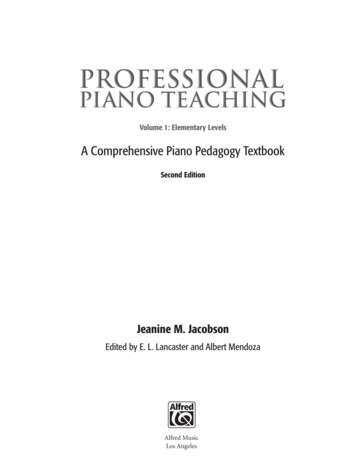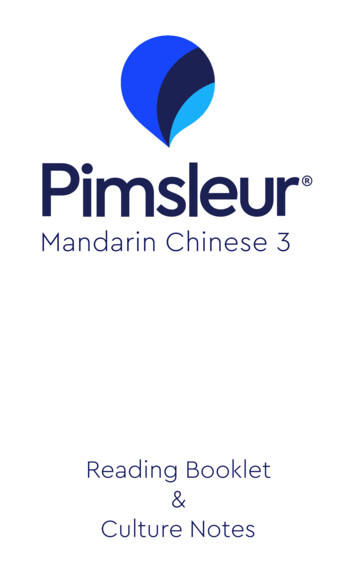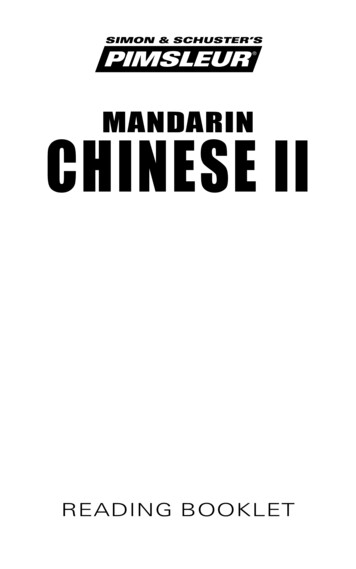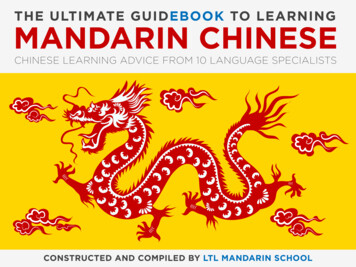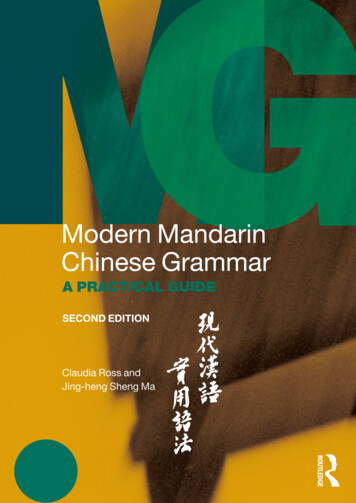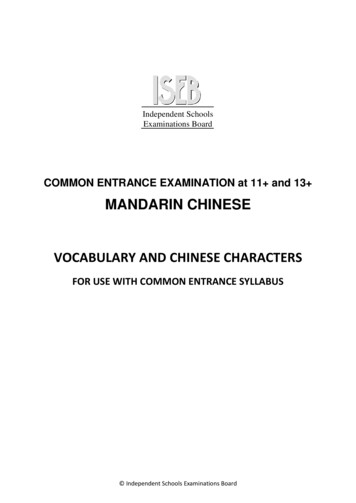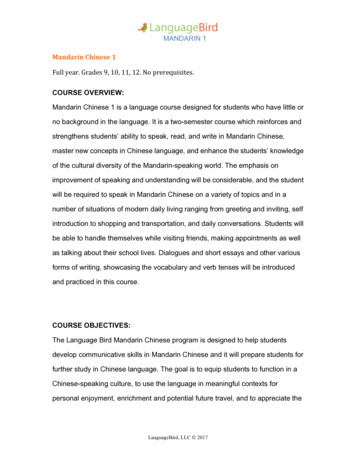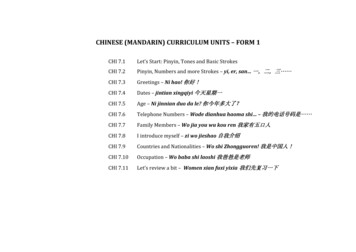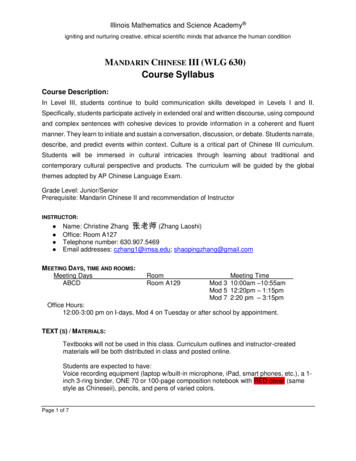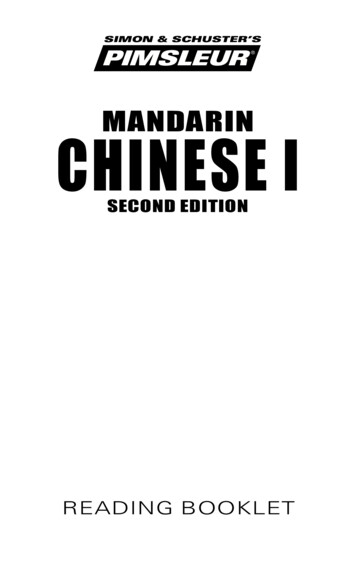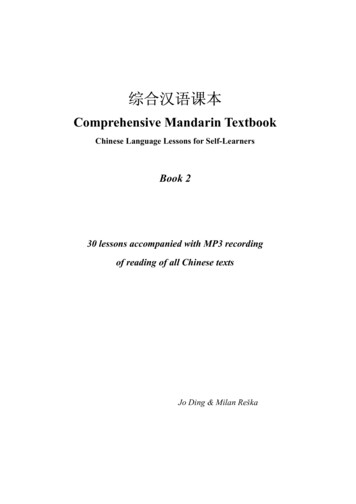
Transcription
综合汉语课本Comprehensive Mandarin TextbookChinese Language Lessons for Self-LearnersBook 230 lessons accompanied with MP3 recordingof reading of all Chinese textsJo Ding & Milan Reška
Copyright Jo Ding & Milan Reška Illustrations Chen Xiangning 2009 Illustrations Li Jinhua 2009 book cover illustrationReading by 孟竹 MengZhu and丁凌 Jo DingPrinted and bound in the European Union by H.R.G. spol. s r.o., www.hrg.cze-mail: senlin@senlin.euwww.senlin.eu 2010 Senlin Publishing s.r.o.Brno, Czech Republic, EUISBN 978-80-254-8063-22
TCMComprehensive Mandarin TextbookCMTContentsContents . 3Introduction. 4Lesson 1 第一课 . 5Lesson 2 第二课 . 11Lesson 3 第三课 . 16Lesson 4 第四课 . 23Lesson 5 第五课 . 28Lesson 6 第六课 . 34Lesson 7 第七课 .Error! Bookmark not defined.Lesson 8 第八课 .Error! Bookmark not defined.Lesson 9 第九课 .Error! Bookmark not defined.Lesson 10 第十课 .Error! Bookmark not defined.Lesson 11 第十一课 .Error! Bookmark not defined.Lesson 12 第十二课 .Error! Bookmark not defined.Lesson 13 第十三课 .Error! Bookmark not defined.Lesson 14 第十四课 .Error! Bookmark not defined.Lesson 15 第十五课 .Error! Bookmark not defined.Lesson 16 第十六课 .Error! Bookmark not defined.Lesson 17 第十七课 .Error! Bookmark not defined.Lesson 18 第十八课 .Error! Bookmark not defined.Lesson 19 第十九课 .Error! Bookmark not defined.Lesson 20 第二十课 .Error! Bookmark not defined.Lesson 21 第二十一课 .Error! Bookmark not defined.Lesson 22 第二十二课 .Error! Bookmark not defined.Lesson 23 第二十三课 .Error! Bookmark not defined.Lesson 24 第二十四课 .Error! Bookmark not defined.Lesson 25 第二十五课 .Error! Bookmark not defined.Lesson 26 第二十六课 .Error! Bookmark not defined.Lesson 27 第二十七课 .Error! Bookmark not defined.Lesson 28 第二十八课 .Error! Bookmark not defined.Lesson 29 第二十九课 .Error! Bookmark not defined.Lesson 30 第三十课 .Error! Bookmark not defined.Answers to the test questions.Error! Bookmark not defined.Vocabulary .Error! Bookmark not defined.3
IntroductionThis book has been written with the needs of the students of Mandarin Chinese constantly in mind.No matter what you’ve heard or how you feel about it, the Chinese language is easy. Its grammar issimple. While the pronunciation and written characters may initially put people off, Chinese is in fact afar easier language to learn than English, German, or Spanish, not to mention Japanese, Indian, or theSlavic languages.With this textbook, the second one in a series of Comprehensive Mandarin textbooks, you will be able tounderstand better and speak Chinese more fluently, as well as read more difficult texts.The recorded material accompanying this book covers all of the Chinese - English texts, including thevocabulary, sentences, dialogues, grammar points, and other texts in order to help you with yourlistening skills and pronunciation.Of course, learning another language depends not only on the textbook, but also on the time you spendstudying it. This is why all of the lessons have been recorded, so that you can listen to them whereveryou are without needing the book, although, the book will help you to clarify any points you have havemissed or misunderstood.The length of time it will take to complete this textbook depends entirely on the student and how muchtime they have at their disposal. Some may choose to study one lesson per day for 30 days, or one lessonper week. In any case, you should dedicate at least 15 minutes a day to learning the language in order toprogress at a reasonable pace.Structure of the bookEach lesson is divided into, and the recorded files on the CD follow in exactly the same order.4Introduction
Comprehensive Mandarin TextbookTCMLesson 1CMT第一课Vocabularycontractrecord, notes taken down; take downclerkdocumentaffair, thingnewspapertypeput in orderbe afraid, I’m afraidin the process of (doing sth.)fairlyexcept, besidesCíhuìhétonɡ (n.)jìlù (n., v.)wényuán (n.)wénjiàn (n.)shìqínɡ (n.)bàozhǐ (n.)dǎ (v.)zhěnɡlǐ (v.)kǒnɡpà (adv.)zhènɡzài (adv.)hái (adv.)chúle ��整理恐怕正在还除了 以外Proper NamesA full Chinese nameA full Chinese nameA full Chinese nameZhuānyǒu ��倩张慧王丽SentencesCould you help me type thecontracts when you finishtyping the conference record?I’m afraid I can’t.Besides the conference recordI have a report to finish.Apart of filing the documents,she does not have anythingelse to do.I’d better type it by myself.Jùzi句子Nǐ dǎ wán huìyì jìlù bānɡ 你 打 完 会 议 记 录 帮 我 打wǒ dǎ pà bùxínɡ。恐怕不行。Chúle huìyì jìlù yǐwài,wǒ 除了会议记录以外,我还háiyǒu yífèn bàoɡào yào xiě。 有一份报告要写。Chúle zhěnɡlǐ wénjiànyǐwài,tā méiyǒu biédeshìqínɡ le。Wǒ háishì zìjǐ dǎ bɑ。DialogueHuìhuà 会话LǐQiàn:ZhānɡHuì,nǐ xiànzài mánɡ mɑ?李倩:张慧,你 现 在 � Háihǎo。Yǒu shénme shìr mɑ?张慧: 还 好。有什 么事儿吗?LǐQiàn:Nǐ nénɡ bānɡ wǒ dǎ liǎnɡfèn hétonɡ mɑ?李倩:你能帮我 打 两 份 合同吗?ZhānɡHuì: Jí mɑ?Wǒ zhènɡzài dǎ zǎoshɑnɡde huìyì jìlù。张慧: 急吗?我正 在 打 早 上 的会 议记录。LǐQiàn:Nà nǐ dǎ wán huìyì jìlù bānɡ wǒ dǎ hétonɡ,kěyǐmɑ?李倩:那 你 打 完 会议记录 帮我 打 合同,可以吗?ZhānɡHuì: Kǒnɡpà bùxínɡ。Chúle huìyì jìlù yǐwài,wǒ háiyǒu yífèn bàoɡào yào xiě。张慧: 恐怕不 行。 除了会议 记录以外,我 还 有一份 报 告 要 写。Lesson 1第一课5
Rúɡuǒ nǐ bù jí,wǒ xiě wán bàoɡào bānɡ nǐ dǎ bɑ。如果 你 不急,我 写 完报 告 帮 你 打 吧。LǐQiàn:Búyònɡ le, nǐ yě tǐnɡ mánɡ de。Wǒ háishì zìjǐ dǎ bɑ。李倩:不用了,你 也 挺忙的。我 还 是自己 打吧。ZhānɡHuì: Nǐ wènwen xīn lái de nàɡè wényuán,kěnénɡ tā yǒu shíjiān。张慧: 你 问 问新来 的那个 文 员,可 能 她 有 时 间。LǐQiàn:Duì,wǒ qù wènwen。李倩:对, 我 去 问 问。Tā hǎoxiànɡ chúle zhěnɡlǐ wénjiàn yǐwài,méiyǒu biéde shìqínɡ le。她 好 像除了整 理 文 件以外,没有 别的 事 情 了。ZhānɡHuì: Nǐ kàn,tā zài kàn bàozhǐ ne。张慧: 你 看,她 在 看 报纸 呢。LǐQiàn:Duìle, nǐ zhīdào tā jiào shénme mínɡzi mɑ?李倩:对 了,你 知道 她 叫 什 么 名 字吗?ZhānɡHuì: Bú tài qīnɡchu。Nǐ wènwen WánɡLì bɑ。Tā shuíde mínɡzi dōu zhīdào。张慧: 不 太 清 楚。你 问 �慧:6王 丽 吧。她 谁 的名字都 知 道。Zhanghui, are you busy now?It’s ok. What’s up?Can you help me type two contracts?Is it urgent? I am typing this morning’s conference record.Then could you help me type the contracts when you finish typing the conference record?I’m afraid I can’t. Besides the conference record, I still have another report to write.If you are not in a hurry, I can type for you after I finish my report.No, thanks. You are quite busy. I’d better type it by myself.You can ask the new clerk. Perhaps she has time.Yes. I will try.It seems she doesn’t have a lot of things to do apart of filing documents.Look, she is reading a newspaper.By the way, do you know her name?No. You can ask Wangli. She knows everyone’s ��丽吧。她谁的名字都知道。Lesson 1第一课
TCMGrammar points YǔfǎComprehensive Mandarin TextbookCMT语法1. 正在 zhènɡzài is put before verb to indicate that the action is �(家里)电 视。I am watching TV (at �ofàn(chúfánɡ)她吃在(厨 房)早 饭She is having breakfast (in the étonɡ他正打合同He is typing a �。ne呢ne。呢。Sometimes 正 zhènɡ or 在 zài can be omitted, and the meaning is the same, but normally if the place isnecessary, 在 zài can’t be omitted. 呢 ne can be added at the end of the sentences to soften the tone,especially with 正 zhènɡ.If we put different time before, that shows the action is underway at that time. For 。Zuótiān zǎoshɑnɡ bādiǎn,wǒ zhènɡzài jiā shuìjiào ne。Yesterday morning I was sleeping at eight.现在我在看书。Xiànzài wǒ zài kànshū。I am reading a book ɡtiān zǎoshɑnɡ shídiǎn,wǒ zài shànɡ Hànyǔ kè。I will have my Chinese lesson tomorrow morning at ten o’clock.The negative form uses 没在 méizài。她没在看书,她在看电视。Tā méizài kàn shū,tā zài kàn diànshì。She is not reading. She is watching TV.在 zài can be omitted.她没看书,她在看电视。Tā méi kàn shū,tā zài kàn diànshì。She is not reading. She is watching TV.2. 除了 chúle 以外 yǐwài means except when it goes with 都 dōu or negative ��欢吃。Chúle pútɑo yǐwài,qítāde shuǐɡuǒ wǒ dōu xǐhuɑn chī。Except grapes, I like all other �喜欢吃。Chúle pútɑo yǐwài,qítāde shuǐɡuǒ wǒ dōu bù xǐhuɑn chī。Except grapes, I don’t like any other fruit.除了 chúle 以外 yǐwài means besides when it goes with 还 hái or 也 �Chúle pútɑo yǐwài,wǒ hái xǐhuɑn chī xīɡuā。Besides grapes, I also like 瓜。Chúle pútɑo yǐwài,wǒ yě xǐhuɑn chī xīɡuā。Besides grapes, I like watermelon, too.以外 yǐwài can be 欢吃。Chúle pútɑo,qítāde shuǐɡuǒ wǒ dōu bù xǐhuɑn chī。Except grapes, I don’t like any other e pútɑo,wǒ hái xǐhuɑn chī xīɡuā。Besides grapes, I also like watermelon.3. 上 shànɡ and 下 xià usually used to name the thing divided in two parts, similar to the A and B inEnglish.Lesson 1第一课7
ReadingYuèdú阅读:VocabularyTV stationon-the-spot, scenereport, news reportfiredisasterfire accidentfire brigadefirefightersfire master, fire chiefreasonsmokeflapextinguishput outhurt, injure; woundbe hurt, be injuredhappenmeasure word for accidentmeasure wordsound;measure word for soundbangCíhuìdiànshìtái (n.)xiànchǎnɡ (n.)bàodào (n.)huǒ (n.)zāi (n.)huǒzāi (n.)xiāofánɡduì (n.)xiāofánɡ duìyuán (n.)xiāofánɡ duìzhǎnɡ (n.)yuányīn (n.)yān (n.)pū (v.)miè (v.)pūmiè (v.)shānɡ (v., n.)shòushānɡ (v.)fāshēnɡ (v.)qǐ (measure word)chǎnɡ (measure word)shēnɡ (n., measure word)pēnɡ (mimetic �受伤发生起场声砰Proper NameBright Pearl TV StationZhuānyǒu MínɡcíMínɡzhū diànshìtái专有名词明珠电视台新 闻 报道 (上)Xīnwén bàodào(Shànɡ)News Reporting (Part 1)大家 好!这里 是明珠电视 台。Dàjiā hǎo!Zhèlǐ shì Mínɡzhū diànshìtái。现 在 我们正在一家 小商店门口做现 场报 道。Xiànzài wǒmen zhènɡzài yìjiā xiǎo shānɡdiàn ménkǒu zuò xiànchǎnɡ bàodào。这里 刚刚发生了一起 火灾。Zhèlǐ ɡānɡɡānɡ fāshēnɡ le yìqǐ huǒzāi。消防队 员 已经扑灭 了大火。没 有 人 受伤。Xiāofánɡ duìyuán yǐjīnɡ pūmiè le dàhuǒ。Méiyǒu rén shòu shānɡ。我 们 问 一下 消防队 长:Wǒmen wèn yíxià xiāofánɡ duìzhǎnɡ:“请问, 您 知 道发生这 场火灾的 原 因 吗?”“Qǐnɡwèn,nín zhīdào fāshēnɡ zhèchǎnɡ huǒzāi de yuányīn mɑ?”8Lesson 1第一课
TCM“还 没 有,我 们 正Comprehensive Mandarin TextbookCMT在 查。”“Hái méiyǒu,wǒmen zhènɡzài chá。”“商店 老板 在哪儿呢?”“Shānɡdiàn lǎobǎn zài nǎr ne?”“我 们 也 在 找 他呢。哦,在那儿。”“Wǒmen yě zài zhǎo tā ne。 ò ,zài nàr。”“你好。 请问 你 是 这家 商店的老 板 吗?”“Nǐhǎo。Qǐnɡwèn nǐ shì zhèjiā shānɡdiànde lǎobǎn mɑ?”“是的。我 就 是。”“Shìde。Wǒ jiù shì。”“你 知 道 为 什 么发生这 场火灾 吗?”“Nǐ zhīdào wèishénme fāshēnɡ zhèchǎnɡ huǒzāi mɑ?”“我 不 太 清 楚。”“Wǒ bú tài qīnɡchu。”“火 灾 发生 的 时候,你在哪儿?”“Huǒzāi fāshēnɡde shíhou,nǐ zài nǎr?”“我 在 门 口 和 一个 朋 友 聊天儿,然后 我 们 听 到‘砰’的 一声,“Wǒ zài ménkǒu hé yíɡè pénɡyou liáotiānr,ránhòu wǒmen tīnɡdào ‘pēnɡ’de yìshēnɡ,我 们 看 到 很多烟,我的朋友 就 打 119了。”wǒmen kàndào hěnduō yān,wǒde pénɡyou jiù dǎ yāo yāo jiǔ le。”“那时 在你的 商店 里,还有 别的人 吗?”“Nàshí zài nǐde shānɡdiàn lǐ,háiyǒu biéde rén mɑ?”“没 有。今 天生意 不太 好。“Méiyǒu。Jīntiān shēnɡyi bú tài hǎo。除 了我 没 有别的 人,所以 我 和 朋 友 在 门 口 聊天儿。”Chúle wǒ méiyǒu biéde rén,suǒyǐ wǒ hé pénɡyou zài ménkǒu liáotiānr。”He
CMT Comprehensive Mandarin Textbook CMT Grammar points Yǔfǎ 语法 1. 正在zhènɡzài is put before verb to indicate that the action is underway. subject zhènɡzài 正 在 (place) verb object (ne) (呢) Wǒ 我 zhènɡzài 正 在 (jiālǐ) (家里) kàn 看 diànshì。 电 视。 I am watching TV (at home). subject zài 在 (place) verb object (ne) (呢) Tā 她 zài .
